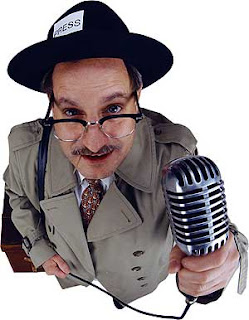 Here’s a story that really hit home for me: the struggle of journalists to keep their faith.
Here’s a story that really hit home for me: the struggle of journalists to keep their faith.
It comes from The Quill, the journal of the Society of Professional Journalists (SPJ):
When Los Angeles Times reporter William Lobdell was given the religion beat, he believed God had, literally, answered his prayers.
But, as Lobdell confessed last summer in a first-person, front-page Times story, eight years of religion reporting that included the worst of the priest sex abuse scandals took a personal, painful toll.
A one-time born-again Christian, Lobdell said reporting on the darker side of religion led him to lose his faith. He also told his editors he wanted off the beat.
Although journalists are stereotyped as a secular and nonreligious lot, surveys show that about 70 percent of journalists profess a faith tradition.
With religion as a component in today’s front page news — from the war in Iraq to the U.S. presidential campaign — it’s harder for journalists to separate their private faith from their public profession.
People’s religious beliefs affect how they vote, raise their children, and spend their time and money. As Lobdell’s story shows, it can affect their work as a journalist, too, regardless of their beat, medium or position.
Common sense and experience help guide journalists wondering whether it’s possible to follow a faith tradition, while being trained to question everything.
Lobdell’s example shows — and he’s not alone — that sometimes a journalist’s job challenges a person’s faith. But thousands of others find no such contradiction. And a very small, but growing, number of journalists see working in the mainstream media as a religious mission.
Although politicians rarely ask journalists their political preferences, reporters on all beats may be asked their religion when querying sources about matters of faith.
Veteran religion reporters, who are used to the question, say there is no single right way to respond. In an era in which journalistic transparency is prized, some journalists are upfront. Others answer in general terms — “I’m Christian” or “I’m Jewish” — and move on with the interview. Some deflect the question and explain it’s the source’s beliefs that are pertinent.
No matter what approach, journalists should assure sources they are able to report about a source’s faith with accuracy and fairness.
There’s more, including tips and advice. Well worth reading.
For myself, I can say it is a struggle sometimes to work as an ordained religious in a profession that is unapologetically secular. But I have to say, too, that most of those I’ve encountered appreciate what I do, and who I am; I’ve written elsewhere about the gratifying experience of giving out ashes at CBS on Ash Wednesday. People routinely call me “Deacon” around the newsroom — for a while, Katie Couric was calling me “Father Greg” — and one of our directors (who is Jewish) likes to ask me, “How’s this Sunday’s sermon going?”
Generally, journalists aren’t faithless. But religion is certainly something most don’t wear on their sleeve. And reporters are, by their nature, skeptical of anything powerful — like the Church. (That skepticism is one reason why I once cracked that St. Thomas, the doubting disciple, should be the patron saint of journalists.)
Do I consider working in the newsroom a mission? I hadn’t really thought of it that way. But I’m reminded of what Mother Theresa used to tell people who arrived at her doorstep in India, seeking to help. She’d sigh and tell them, “You don’t need to be here. Find your own Calcutta.”
Perhaps, CBS News is my Calcutta.

